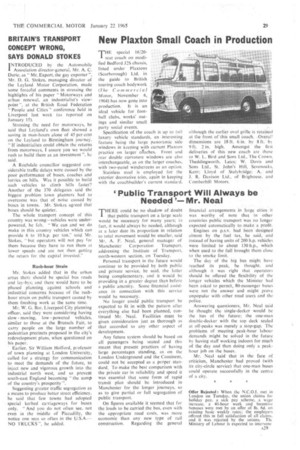BRITAIN'S TRANSPORT CONCEPT WRONG, SAYS DONALD STOKES
Page 31

If you've noticed an error in this article please click here to report it so we can fix it.
I NTRODUCED by the Automobile
Association director-general, Mr. A. C. Durk, as " Mr. Export, the gay exporter Mr. D. G. Stokes, managing director of the Leyland Motor Corporation, made some forceful comments in stressing the highlights of his paper " Motorways and urban renewal, an industrialist's viewpoint ", at the British Road Federation " People and Cities conference held in Liverpool last week (as reported on January 15).
Stressing the need for motorways, he said that Leyland's own fleet showed a saving in man-hours alone of 45 per cent on the Leyland to Birmingham journey. "If industrialists could obtain the returns from motorways, I assure you we would rush to build them as an investment ", he said.
A Rochdale councillor suggested considerable traffic delays ware caused by the poor performance of buses; coaches and lorries on hills. Was it possible to build such vehicles to climb hills faster? Another of the 370 delegates said the biggest problem town planners had to overcome was that of noise caused by buses in towns. Mr. Stokes agreed that buses should be quieter.
The whole transport concept of this country was wrong—vehicles were under powered, he felt. We can and we do make in this country vehicles which can provide 6 to 10 h.p. per ton:: said Mr. Stokes," but operators will not pay for them because they have to run them at lower speeds and are not then getting the return for the capital invested."
Rush-hour Strain Mr. Stokes added that in the urban areas there should be special bus roads and lay-bys; and there would have to be phased planning against schools and industrial concerns because of the rushhour strain on public transport caused by them finishing work at the same time.
Mr. W. G. Bor, Liverpool City planning officer, said they were considering having slow moving, low powered vehicles, similar to those at the Brussels Fair, to carry people on the large number of pedestrian precincts proposed in the city's redevelopment plans, when questioned on his paper.
Earlier, Sir William Holford, professor of town planning at London University, called for a strategy for communication to meet the demands of the future, to inject new and vigorous growth into the industrial north west, and so prevent south-east England becoming "the sump of the country's prosperity ".
Suggesting greater traffic segregation as a means to produce better street efficiency, he said that few towns had adopted special kerbed carriageways for buses only. And you do not often see, not even in the middle of Piccadilly, the notice one sees so often in the U.S.A.— NO 1 RUCKS he added.




















































































































